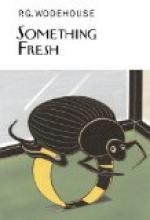The first time he appeared in Arundell Street in his sweater and flannels he had barely whirled his Indian clubs once around his head before he had attracted the following audience:
a) Two cabmen—one intoxicated; b) Four waiters from the Hotel Mathis; c) Six waiters from the Hotel Previtali; d) Six chambermaids from the Hotel Mathis; e) Five chambermaids from the Hotel Previtali; f) The proprietor of the Hotel Mathis; g) The proprietor of the Hotel Previtali; h) A street cleaner; i) Eleven nondescript loafers; j) Twenty-seven children; k) A cat.
They all laughed—even the cat—and kept on laughing. The intoxicated cabman called Ashe “Sunny Jim.” And Ashe kept on swinging his clubs.
A month later, such is the magic of perseverance, his audience had narrowed down to the twenty-seven children. They still laughed, but without that ringing conviction which the sympathetic support of their elders had lent them.
And now, after three months, the neighborhood, having accepted Ashe and his morning exercises as a natural phenomenon, paid him no further attention.
On this particular morning Ashe Marson skipped with even more than his usual vigor. This was because he wished to expel by means of physical fatigue a small devil of discontent, of whose presence within him he had been aware ever since getting out of bed. It is in the Spring that the ache for the larger life comes on us, and this was a particularly mellow Spring morning. It was the sort of morning when the air gives us a feeling of anticipation—a feeling that, on a day like this, things surely cannot go jogging along in the same dull old groove; a premonition that something romantic and exciting is about to happen to us.
But the southwest wind of Spring brings also remorse. We catch the vague spirit of unrest in the air and we regret our misspent youth.
Ashe was doing this. Even as he skipped, he was conscious of a wish that he had studied harder at college and was now in a position to be doing something better than hack work for a soulless publishing company. Never before had he been so completely certain that he was sick to death of the rut into which he had fallen.
Skipping brought no balm. He threw down his rope and took up the Indian clubs. Indian clubs left him still unsatisfied. The thought came to him that it was a long time since he had done his Larsen Exercises. Perhaps they would heal him.
The Larsen Exercises, invented by a certain Lieutenant Larsen, of the Swedish Army, have almost every sort of merit. They make a man strong, supple, and slender. But they are not dignified. Indeed, to one seeing them suddenly and without warning for the first time, they are markedly humorous. The only reason why King Henry, of England, whose son sank with the White Ship, never smiled again, was because Lieutenant Larsen had not then invented his admirable exercises.




